Linux is the most precious operating system for programmers and hacker. Linux user can perform numerous such tasks that a Windows or Mac user can’t even imagine. Linux also provides a graphical user interface but if you want to get the best of Linux, you should be working on its command-line Interface.
But there’s a problem. Sometimes Linux can go extremely up to the extent that it can do serious damage to the system. Most of the time, Linux system doesn’t even ask the user for confirmation once the command is given and simply performs its task.
Because of these harmful activities of Linux, it is recommended to use it only if you are good at giving commands and have in-depth knowledge of Linux commands list.
Contents
5 Most Deadly Linux Commands
1. rm -rf /
This command will Delete Everything from your computer. It is a combination of three keywords. rm will remove all the files followed by this command. -rf will run rm command in the more effective way and will remove all files and folders inside the specified folder without asking confirmation from the user. “/” will start removing the data from the root directory and will delete everything from the computer including the data of removable media.
2. :(){ :|: & };: Sh
This command creates a shell function, which once gets initialized starts to create multiple copies of itself. It results in taking quickly all the memory and power of CPU. It makes computer freeze or not responding. This is also known as Denial Of Service Attack.
3. mkfs.ext4 /dev/sda1
This command will format the hard disk. This command is again composed of two keywords. mkfs.Ext4 command will create a new ext4 file system on the following device where this command will get executed. /dev/sda1 specifies the 1st partition on the first hard disk which is probably in use by the user. Similarly, This Command > mkfs.ext3 /dev/sdb2 will Format the second partition on the second hard disk with an ext3 File system.
4. /dev/sda
This command will Write Any content Directly to a Hard Drive. This command will execute normally as other commands in Linux do. But the output of this command will directly be sent to the file system (NTFS or FAT ) of the Hard Drive. It will result in damaging the file system of the computer.
5. mv ~ /dev/null –
This command will turn your home directory into a Blackhole. Moving any of your content and data to the following path: /dev/null means you want to destroy it. It means /dev/null is a black hole where once anything sent, cannot be recovered back.

